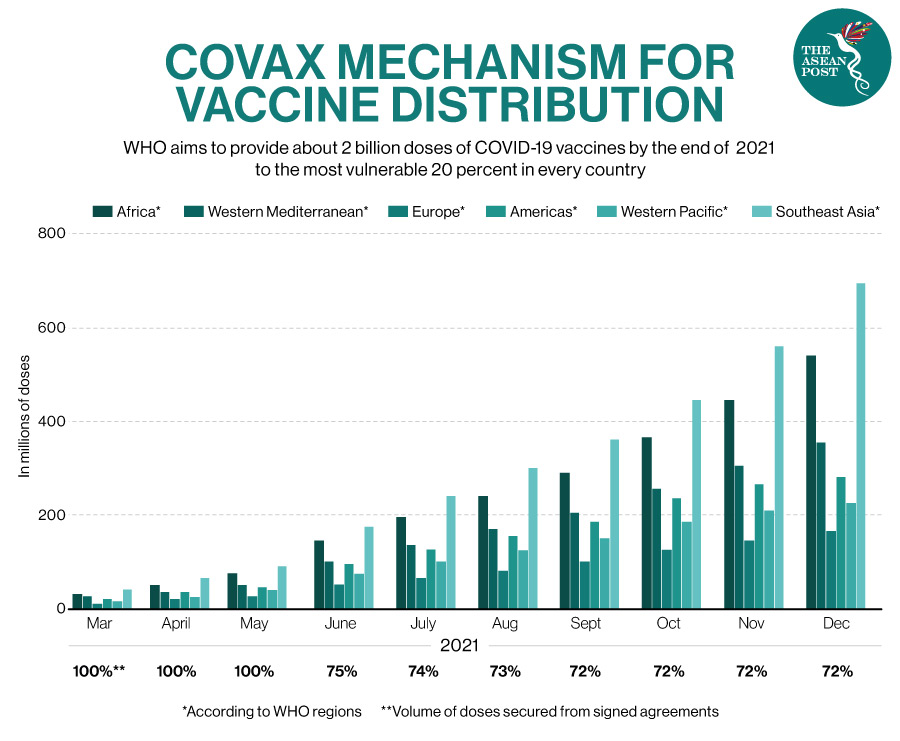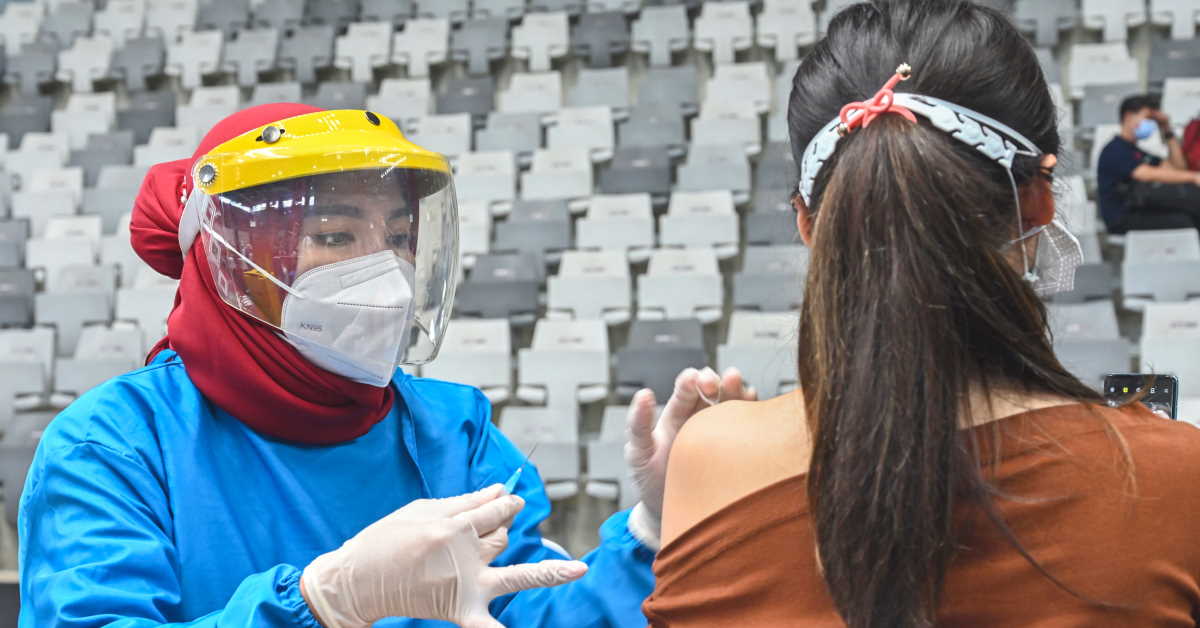More than 105 million people worldwide have been infected with COVID-19 since the disease first emerged a little over a year ago. The pandemic has claimed over two million lives – with millions of others suffering from job losses, affected livelihoods, deaths of family and friends, and starvation, among other devastating impacts of the virus.
According to our tally which is updated daily at 7:00 pm on The ASEAN Post’s Facebook page, the ASEAN bloc has reported some two million cases to date, and 46,130 deaths – at the time of writing.
As cases surge across the region, it seems like the only hope to stem the tide is a viable vaccine. But are we going to get inoculated anytime soon?
Vaccination Programmes
The United Kingdom (UK) became the first country to authorise a COVID-19 vaccine – which was then followed by Belgium, Canada, Israel, and Singapore, among others. The latter began its coronavirus vaccination campaign in late December – making it one of the first Asian countries to roll out mass inoculations.
By mid-January, more than 6,200 people in the island-state had received their first doses of the Pfizer vaccine – mainly healthcare workers in public and private hospitals, Home Team officers involved in front-line healthcare operations, and staff from Singapore’s Ren Ci’s Bukit Batok nursing home.
Gan Kim Yong, Singapore’s Health Minister said that eight vaccination centres are to be set up by the end of February.
Whereas neighbouring Malaysia will begin its vaccine rollout by the end of this month – in a bid to immunise some 26.5 million citizens. In a televised address yesterday, premier Muhyiddin Yassin announced it will conduct three phases of the vaccination programme.
The first phase will involve medical and non-medical front-liners, second phase will be for those in the high-risk groups such as senior citizens and the disabled, and lastly, the third phase of the programme will involve the remaining group, aged 18 and above, to be carried out between May 2021 and February 2022.
“The national COVID-19 immunisation programme is the largest vaccination programme ever to be carried out in the country,” said Muhyiddin.
A few weeks ago, Indonesia’s president Joko Widodo received the first dose of China’s Sinovac vaccine live on national television, becoming the first person in the archipelago to be vaccinated.
“This COVID-19 vaccination is important for us to break the chain of this coronavirus transmission and provide health, safety, and protection for all Indonesians," said Jokowi, as the president is popularly known.
Currently, Indonesia has the highest reported number of COVID-19 infections in the region, with over one million cases – accounting for more than 50 percent of ASEAN’s total cases.
Earlier this week, a total of 10 million doses of raw materials for the COVID-19 vaccine from Sinovac Biotech arrived in Indonesia. With the arrival, there are now 28 million doses of the vaccine available in the populous archipelago.
Oscar Primadi, Secretary General of Indonesia’s Health Ministry added that among them, three million doses were ready to use. A spokesperson for the ministry also said that more than 500,000 medical workers have so far been vaccinated. The target is to ensure that 1.5 million medical workers are vaccinated before the end of this month.
The COVAX programme which aims to ensure equitable worldwide access to COVID-19 vaccines published its first distribution list on Wednesday. Indonesia and the Philippines are some of the top countries on the distribution list – and will received doses in proportion to population size.
Indonesia will receive 13.7 million doses, while the latter will receive 5.6 million.
It was also reported that the Philippines is negotiating for 178 million coronavirus vaccine doses, enough to inoculate 92 million people. Carlito Galvez who leads the country’s vaccination programme said that about three million doses will arrive this month, and the bulk in the third and fourth quarters of this year. They will also prioritise health workers and uniformed personnel this quarter, and economic front-liners such as drivers and food services personnel in the second quarter.

In Thailand, where triple digit daily coronavirus tallies have been seen in recent weeks amid an outbreak in Samut Sakhon, the government said last week that it would start its inoculation programme in February by administering the AstraZeneca vaccine to high-risk groups.
On 18 December 2020, Thailand had recorded over 4,000 cases with 60 deaths related to COVID-19. Today, the kingdom has reported over 22,000 cases and 79 deaths to date.
Vietnam was applauded for its swift handling of the its first wave when the pandemic started. Nevertheless, despite a low number of coronavirus cases – at just over 1,900 – a fresh wave of infections caused by a more contagious variant from Britain is indeed concerning.
“We have been very quick in quarantine and contact tracing... but whether we can eliminate the outbreaks, it depends on the whole political system, authorities and the people,” warned Mai Tien Dung, chairman of the government’s office.
According to a Vietnamese news agency, a deal was signed last week for AstraZeneca to supply Vietnam with 30 million doses in the first half of this year for domestic inoculation. Moreover, trials for Nanocovax, the first locally developed vaccine in the country to be tested on humans, began sometime in mid-December last year. Although it has been deemed safe, its efficacy against the virus awaits a final assessment.
ASEAN member state Brunei is reported to be mulling various vaccines, including those from the United States (US), Europe, and China, and “have not rejected any vaccines yet,” said Mohd Isham, the sultanate's Minister of Health.
Whereas Lao PDR, which has only reported 45 cases, vaccinated their first group of frontline officials with the first dose in late November, and the second on 22 December. The vaccination programme was launched after China provided 2,000 doses of the Sinopharm vaccine. Russia has also provided the country with 500 doses of the Sputnik V vaccine.
China also donated one million Sinopharm vaccine doses to Cambodia, which its premier Hun Sen has accepted last month. The fact that the vaccine does not require extremely low storage temperatures such as Pfizer’s would help authorities’ efforts to vaccinate some half a million locals, said the prime minister.
"The vaccination will be free of charge and on a voluntary basis," Hun Sen stressed.
Meanwhile Myanmar, which is under a military coup, launched a COVID-19 vaccination programme across the country on 27 January. The programme started with medical workers who are working in the frontline in the country’s regions and states.
Related Articles:
